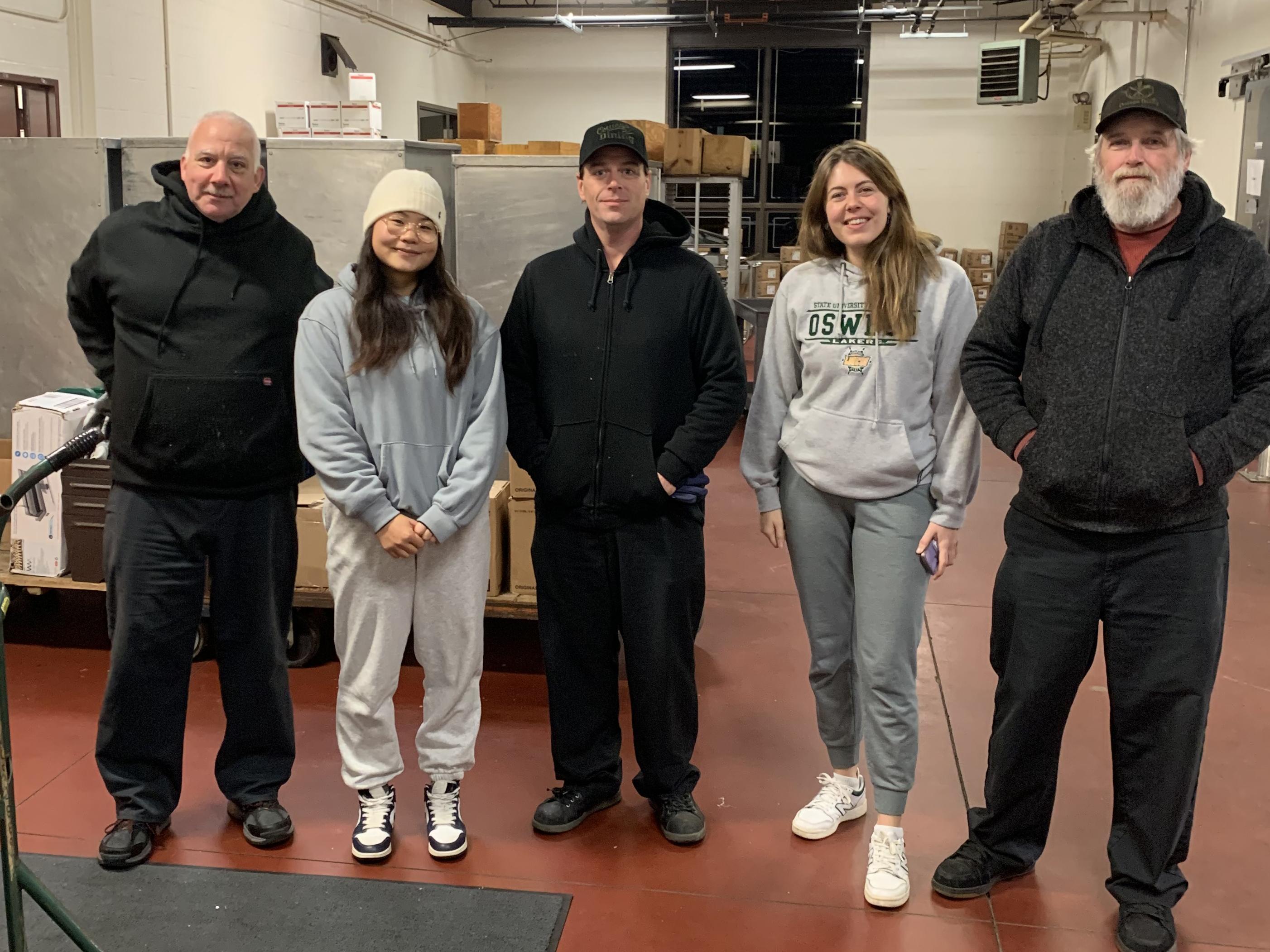A SUNY Oswego’s operations management course has provided students with hands-on experiences and a chance to improve SUNY Oswego’s campus through a partnership with Auxiliary Services.
The MGT 310 course allows students to work in small teams, each assigned to observe a facet of Auxiliary Services’ operations, before analyzing and suggesting growth opportunities for their respective location.
Sarah Bonzo, an associate professor at SUNY Oswego who teaches the course, said that the program not only allows students to apply concepts and methods of evaluating business operations in a more hands-on way, but also the necessary “soft” skills of professionalism needed to establish their partnership with Auxiliary Services.
“When students first had to reach out to the team leaders of each location, we had some simple but profound conversations about how to send a professional introductory email, how to schedule meeting invitations, how to introduce themselves to team members and how to build rapport with employees,” Bonzo said.
While not necessarily part of the students’ evaluations of how to assist Auxiliary Services, the initial process of building rapport was crucial to the students’ success, Bonzo said.
“When it comes to truly understanding operations in any industry or setting, it's important to go see, ask why and show respect," Bonzo said.
“I’ve done this with previous classes, but not with Auxiliary Services, and we’ve never done anything like this on campus before,” Bonzo added.
‘Excited to say yes’
“I was excited to say yes” to this opportunity, said Stephen McAfee, assistant vice president of student affairs and executive director of Auxiliary Services.
The course’s goal, McAfee said, was to create “cross-divisional engagement” in the university in addition to the students’ proposed solutions. Above all, the course was designed to improve campus, McAfee said.
The goal was for students to “find me small things to help us provide a better service,” McAfee said.
The course is offered in a hybrid format, where students have both formal lectures and observation days, and time to analyze various Auxiliary Services locations on campus before suggesting potential improvement opportunities based on their observations at the end of the course.
“They have been doing observations for the entire semester,” Bonzo said. “The first half of the semester was just getting a good understanding of how the operations run, and the second half of the semester is really doing a deeper dive on some of those opportunities.”
The students’ observations not only include ways to improve campus operations, but in analyzing what the correct solution might be, and the steps to get there, such as one student group’s analysis of Lake Effect Cafe’s ice machine, Bonzo said.
The cafe does not include an ice machine that can make enough to accommodate all customers, so Auxiliary Services staff have to walk across campus multiple times per day to move over ice from other locations, Bonzo said. “This takes [a Lake Effect employee] out of the cafe, and then the line backs up,” she noted.
The student groups worked with multiple Auxiliary Services locations, like dining halls and retail dining facilities, but also with service locations that students do not typically see, like the Commissary, which is located off campus.
Following their observations and analyses of various Auxiliary Services locations, the MGT 310 students pitched their proposed solutions to Auxiliary Services in order to gauge whether they could be implemented, Bonzo said.
The student teams have been “really clear in terms of why this is a challenge, how it is impacting the customer experience, and then putting together a really solid proposal for opportunities to address these issues,” Bonzo said.
Providing student perspectives
Abigail Hansen, one of the MGT 310 students working with Lake Effect Cafe, said that the process was not only about providing a students’ perspective on providing practical solutions, like the upgraded ice machine, but about learning how to communicate effectively between multiple campus departments.
“We were working directly with Lake Effect Cafe, but we had to set up meetings to speak with five or six separate departments all over campus,” Hansen said.
The Lake Effect Cafe student group focused on resolving storage issues, and investigating whether a new ice machine was warranted. While the group concluded that a new ice machine was likely currently out of reach for the cafe, the group had improved the cafe’s storage. Even if their proposals were not fully implemented, the hands-on experience was invaluable, Hansen said.
“This is just the most hands-on project that many of us have ever done,” Hansen said. “It’s been great.”
McAfee believes that this hands-on approach not only helps students learn more effectively, but also exemplifies what SUNY Oswego was founded to do.
“This is just living [Edward Austin Sheldon’s] model,” McAfee said.
By working with a side of campus that students do not necessarily see, the MGT 310 students gained both an appreciation for the daily work that goes into sustaining their campus, and a genuine desire to assist Auxiliary Services in improving their services, McAfee said.
“‘Passion’ is the right word,” McAfee said.
After viewing the students’ presentations, McAfee believes many of the students’ proposals will be implemented, and there are plans for an additional section of MGT 310 to be taught in the spring semester.
“There are several short-term [implementations] and at least one long-term one,” McAfee said.
McAfee counts the first-of-its-kind cooperation between MGT 310 and Auxiliary Services as a success.
“I knew this was the right decision,” McAfee said.
–- Written by Ethan Semeraro of the Class of 2023




